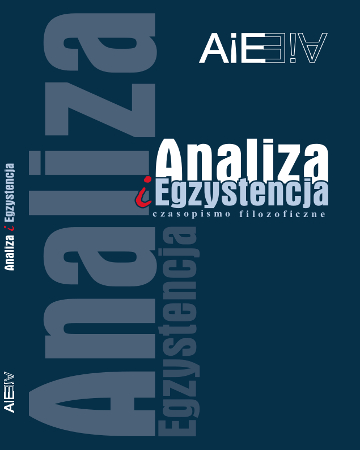
ISSN: 1734-9923
eISSN: 2300-7621
OAI
DOI: 10.18276/aie.2016.36-02






Issue archive /
36 (2016)
Czy istnienie móże być lepsze albo gorsze od nieistnienia? Część II: Wartości osobowe a obiektywne racje moralne
(Can existencebe better or worse than nonexistence? Part I: Person's Values and the Objective Moral Reasons)
| Authors: |
Mirosław
Rutkowski
Uniwersytet Szczeciński |
| Keywords: | existence, nonexistence, wellbeing, person’s value |
| Data publikacji całości: | 2016 |
| Page range: | 27 (25-51) |
Abstract
CAN EXISTENCE BE BETTER OR WORSE THAN NONEXISTENCE? PART I
The aim of this paper is to examine whether there is any possibility to compare the value of someone’s existence with his nonexistence. The final conclusion is that such a comparative evaluation can never be made in a meaningful and valid manner. Nobody can know as well whether he would be better off or worse off created than he would have been had he never existed.
Download file
Article file
Bibliography
| 1. | Adler, M.D. (2009). Future Generations: A Prioritarian View. The George Washington Law Review, 77, 1478. |
| 2. | Arrhenius, G., Rabinowicz, W. (2010). Better to Be Than not to Be. W: H. Joas, B. Klein (eds.), The Benefit of Broad Horizon. Intellectual and Institutional Preconditions for a Global Social Science. Leiden–Boston: Brill Academic Publishers. |
| 3. | Barnes, E. (2014). Valuing Disability, Causing Disability. Ethics, 125, 1. |
| 4. | Broome, J. (1999). Ethics out of Economics. Cambridge: Cambridge University Press. |
| 5. | Buchanan, A., Brock, D.W., Daniels, N., Wikler, D. (2000). From Chance to Choice. Genetics and Justice. Cambridge: Cambridge University Press. |
| 6. | Bykvist, K. (2006). The Benefits of Coming into Existence. Philosophical Studies, 135 (3), 335–362. |
| 7. | Dasgupta, P. (1995). An Inquiry into Well-Being and Destination. Oxford: Oxford University Press. |
| 8. | Feinberg, J. (1987). Wrongful Life and the Counterfactual Element in Harming. Social Philosophy and Policy, 4 (1). |
| 9. | Heyd, D. (1992). Genethics. Moral Issues in the Creation of People. Berkeley: CA: University of California Press. |
| 10. | Holtug, N. (2011). On the Value of Coming into Existence. The Journal of Ethics, 5 (4), 361–384. |
| 11. | Holtug, N. (1996). In Defence of the Slogan. W: W. Rabinowicz (red.), Preference and the Value: Preferentialism in Ethics. Studies in Philosophy. T.I. Lund University, Department of Philosophy. |
| 12. | Narveson, J., (1967). Utilitarianism and New Generations. Mind, 76 (301), 62–72. |
| 13. | Narveson, J., (1978). Future People and Us. W: R.I. Sikora, B. Barry (eds.), Obli- gations to Future Generations (s. 38–60). Philadelphia: Temple University Press. |
| 14. | Parfit, D. (2012). Racje i osoby. Warszawa: Wydawnictwo Naukowe PWN. Rabinowicz, W. (2009). Broome and the Intuition of Neutrality. Philosophical |
| 15. | Issues, 19, 1, 389–411. |
| 16. | Roberts, M.A. (2003). Can it Ever Be Better Never to Have Existed at All? Per- son-Based Consequentialism and the New Repugnant Conclusion. Journal of Applied Philosophy, 20 (2), 159–185. |
| 17. | Roberts, M.A. (1998). Child versus Childmaker: Future Persons and Present Duties in Ethics and the Law. Lanham, Md.: Rowman and Littlefield Publishers. |
| 18. | Różyńska, J. (2011). Wartość (nie)istnienia. Etyka, 44, 124–147. |
| 19. | Ryberg, J. (1995). The Possible People Have Moral Standing? Danish Yearbook of |
| 20. | Philosophy 30, 96-118. |
| 21. | Smilansky, S. (2009). „Wolałbym się nigdy nie urodzić”. W: 10 moralnych para- doksów. Warszawa: WAM. |
| 22. | Williams, B. (1973). Problems of the Self. Cambridge: Cambridge University Press. |